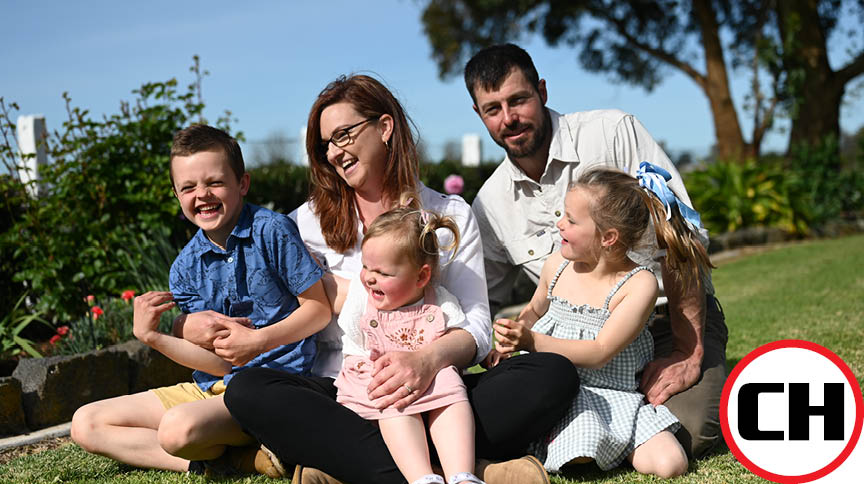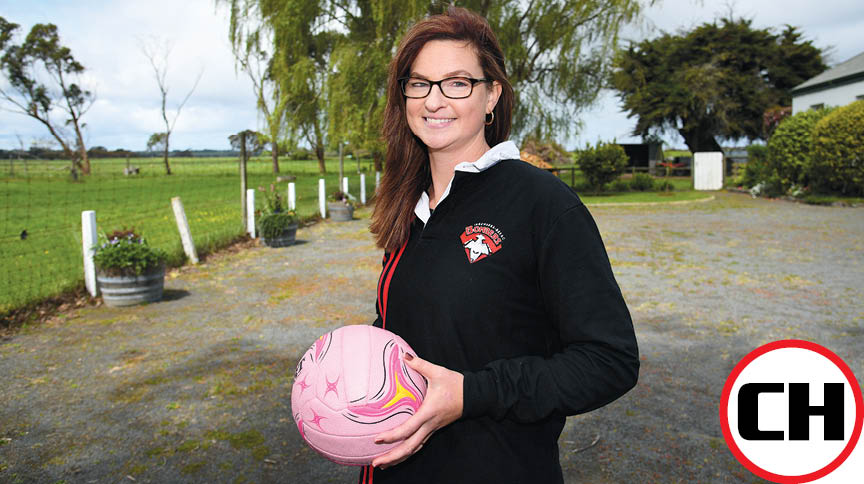Winning a league best-and-fairest this season at the age of 36 with a dodgy knee and playing a new role on the court paled into insignificance for Irrewarra-Beeac netballer Caroline Hitchings, who reached the “lowest moment” of her life three years ago grappling with the devastating effects of postnatal depression. The mum of three wanted to use her personal triumph on the netball court as a platform to speak openly about the trauma she suffered as a new mum and how she overcame her battles to raise awareness and educate people during what is Perinatal Mental Health Week, a national campaign to help the community better understand perinatal mental illness, including signs to look for and where to find support.
DEPTHS OF DESPAIR
“It was the lowest moment of my life when I admitted that I had wished my baby would slip under her blankets and quietly pass away.”
Caroline Hitchings bravely shares the dark thoughts that crept into her mind during the height of her battle with postnatal depression.
Caz found herself back at square one in 2018 after complications from the birth of her third child, a baby girl Isobelle.
Buy the Colac Herald print edition, which has full coverage of all the region's news and sport.
Where To BuyShe was 33 at the time and struggled with signs of PND as a first-time mum with son Jack four years earlier, without being officially diagnosed and dealing with her pain alone.
Caz had a better time two years later welcoming Zoe into the world, but things would take a major turn when Isobelle arrived.
Caz had reached breaking point when she told a nurse she “wished this would all be over” during a home visit to see how she was coping with the newest member of the family.
The problems she had faced in the past had returned, but this was the final straw.
“Isobelle arrived after a swift one-hour delivery and we were back to a newborn baby in the house again,” Caz said.
“Unfortunately the quick delivery caused complications and I was physically very drained for the first few weeks,” she said.
“I hadn’t been eating for fear of consuming something that might upset her stomach when breastfeeding and make her cry – I had lost 10 kilograms in two weeks.
“My mental health immediately declined, and I was skidding down a steep slope that I couldn’t stop.
“Two weeks following her birth I crashed and burned. During a visit from the health nurse, we conducted the mental health survey and I soon burst into tears.
“I was officially diagnosed with postnatal depression, prescribed medication again and a mental health team to support my recovery.”
Caz said her only option was to spend time away from her family to not only get better, but to also escape the guilt.
“I have never in my life felt so ashamed of myself, to wish harm on my own baby,” she said.
“I was admitted to hospital and spent several days recovering away from reality.
“I didn’t want to see Isobelle or my family.”
Caz said self-harm was never an option for her.
She had a loving husband, Paul, and would do anything to protect her growing children Jack and Zoe, who by that stage were the ages of 4 and 2 and her absolute world.
“Suicide is a perfectly normal question, and the answer is no,” Caz said.
“For me I felt worse that I could consider death for my baby but not for me.
“But at that point I hadn’t formed a bond with Belle. It was the thought of leaving my other two children that kept me from considering suicide.”
NEW WORLD
Caz said she always imagined a life with having kids of her own.
“I married Paul when I was 28 and I was so excited to start a family,” she said.
“As the youngest of five kids I was an aunty to many and had babysat numerous times.
“I love kids and couldn’t wait to become a mother myself, so we got married in February 2013 and I fell pregnant I think about May that year.”
Caz and Paul celebrated Jack’s safe arrival in early 2014, but it wasn’t long until she started having trouble with her new life as a full-time mum.
“I had visions of sweet morning cuddles and an untroubled future, but the reality of motherhood quickly set in,” she said.
“Unfortunately Jack wasn’t the easiest of babies, he was very alert and highly strung.
“He catnapped from birth during the day, woke frequently at night and at three months progressed to waking every hour through the night.”
Caz tried every trick in the book, but nothing seemed to work in a bid to settle Jack, which made matters worse.
Finding the answers had become an obsession.
“I quickly became sleep deprived and began researching every little thing about babies I could on the internet,” Caz said.
“I like to be in control and have structure to my life, so when my baby wouldn’t sleep, I wanted to know why and fix it.
“I removed the dummy, I played white noise, we took car rides whilst he screamed, we walked, we cuddled.
“Anything I could do to get my baby to sleep and stop crying, I did. I was so focused on getting my baby to self-settle and connect sleep cycles independently that I could think of nothing else.”
Caz was a successful person in many aspects of life before she married and embarked on motherhood.
She worked as a financial analyst at the Australian Lamb Company, was a respected netballer, playing regularly in the CDFNL’s A Grade ranks, and wasn’t short of friends through her bubbly personality.
But Jack would soon become Caz’s sole priority and she thought her behaviours were normal for a new mum.
“When sleep finally came I would sit silently on the couch to avoid waking him,” she said.
“I wouldn’t answer my phone, I would frequently skip meals, I even avoided going to the toilet for fear the flush would make him stir.
“As a first-time mother this new experience was difficult to swallow, but without knowing how I should be feeling, I assumed this was all part of it and I never actively sought professional help and I didn’t tell my family how I was really feeling.

“I am a successful, independent, together person. I should be able to handle this?”
Melbourne’s Royal Children Hospital suggests excessive crying is associated with higher rates of parental postnatal depression.
“A baby crying is my trigger,” Caz said.
“My anxiety levels would shoot through the roof whenever my baby cried, which was frequent.
“I spent my time as a new mother tied up in knots.
“I was at home on my own because my husband was working long hours out of town at the time, and I began isolating myself and refusing events away from home because I had to establish a routine and get my baby to sleep.”
SPEAKING UP
Caz decided to get on the front foot when she had a little girl about two years after Jack arrived.
“Zoe was a relaxed baby who slept well and was happy,” she said.
“Yet still my anxiety levels shot up and I began obsessing about sleep again.
“I was terrified that the nightmare I had experienced with Jack would return and her happy ways would decline.
“This time I admitted to my GP that I wasn’t coping very well and was prescribed anxiety meds.”
Caz could see light at the end of the tunnel when things were getting easier after Zoe had presented less challenges as a newborn.
She and Paul decided to try for a third, and final child.
“Things settled down, I came off the medication and my husband and I agreed to have a third baby,” she said.
“This time I will be fine, this is my last baby, and I won’t ever have to do this again” was her mindset through pregnancy.
Caz said she was blessed to have Paul and a caring family to help her survive when she reached the end of her tether after Isobelle’s birth three years ago.
Her mum Jan Sexton was constantly by her side, as were Paul’s parents Marg and Garry Hitchings.
“Unlike others, I am very lucky to have an incredibly supportive family and husband,” Caz said.
“My mum came every day for weeks to help with day-to-day life but also to just be there.
“The company made me feel less anxious as I was afraid of being alone with my baby.
“My husband did everything he could to support me and understand a disease he knew nothing about.
“That’s the trouble with mental health diseases, they’re not tangible. There is no obvious sign of encumbrance like a broken leg.
“So for people that have no personal experience with the disease it’s hard to understand.”
Caz also praised healthcare workers and her local doctor for picking her back up off the ground and educating her on coping mechanisms.
She built a strong relationship with maternal child health care nurse Debbie Park.
Debbie is part of a team at Colac Area Health which knows the devastation postnatal depression can inflict on new parents and families.
More than one in seven new mums and up to one in 10 new dads experience postnatal depression or anxiety.
“Postnatal depression presents in many different ways,” Debbie said.
“Some mothers feel overwhelming anxiety as well as being depressed.
“We encourage any mother to come and talk to us, seek help and know that you are not alone.
“We want mums to keep the line of communication open with us and family.
“Being a parent is one of the most difficult jobs, and of course there are no holidays and you don’t get paid other than the kisses and cuddles from your baby.”
MUM TIME
Motherhood will always present its challenges to Caz.
Jack is at school, Zoe is on her way and Isobelle is now three.
“I still have my down days but it’s nothing compared to the sheer hopelessness I felt during the depths of PND,” Caz said.
“I now enjoy a life filled with love, laughter and happiness.

“Sure, some days are still easier than others and my road to recovery continues to evolve, but I love my family unconditionally and feel like I have found the light at the end of my tunnel.”
Caz said making time to do things for herself was an important part of getting her life back on track and switching off from being a mum, which had consumed her in the past.
Her Irrewarra home’s garden is reaping the rewards, while Caz suited up for the town’s netball side again this year despite an ongoing knee injury putting her career in jeopardy.
It was a discussion with Bombers B Grade coach Kate Watts which led Caz, a seasoned defender, to shift into goals for the first time this year to prolong her career.
The move paid off in a big way when Caz claimed the competition’s best-and-fairest award last month.
“For me I have found two outlets that make me happy, my garden and netball,” she said.
“It wasn’t until recently when I faced the prospect of not being able to play through injury that I realised just how important the game is to me, because it’s not just a game at all.
“It’s an opportunity to disconnect from day-to-day life, calm my mind, release some endorphins and recharge my batteries.”
Caz wanted to celebrate her B Grade triumph by telling people her real story.
The popular local netballer said she hoped sharing her struggles as a mum might encourage others with similar problems to seek help.
“My story is not something I have shared with many, particularly the details, but I feel it is an important story to tell, especially for new mums,” she said.
“I never in a million years thought I would suffer from PND.
“I wish now that I had known more and had the courage to reach out for help after my first child.
“I knew I didn’t feel great, but I didn’t realise that my feelings were not normal.
“PND is not something to be ashamed about , although that’s hard to comprehend at the time.”
SUPPORT
Perinatal Anxiety and Depression Australia dedicates a week every year to the perinatal mental health sector to help the community gain a better understanding of mental illness for new parents, what signs to look for a where to find support.
PANDA has Australia’s only free national helpline service for women, men and their families affected by perinatal mental illness.
Debbie said PANDA and Beyond Blue were trusted resources.
She said the Colac district was also blessed to have support services and programs to accommodate and educate young families.
“We have a current list of local psychologists and other referral pathways,” Debbie said.
“We do encourage mums to seek help from their GP who can write them up a Mental Health Care Plan where the mother can gain more affordable counselling sessions.
“We run First Time Parent Groups to help link mothers to other new mothers for social support, we can also refer parents to our new sleep and settling support groups that we have started here at the health centre.
“We can also offer in-home support for mothers whose babies are not sleeping and we have breastfeeding support here at the health centre if mothers are overwhelmed with feeding issues.”
The PANDA National Helpline can be reached on 1300 726 306.










